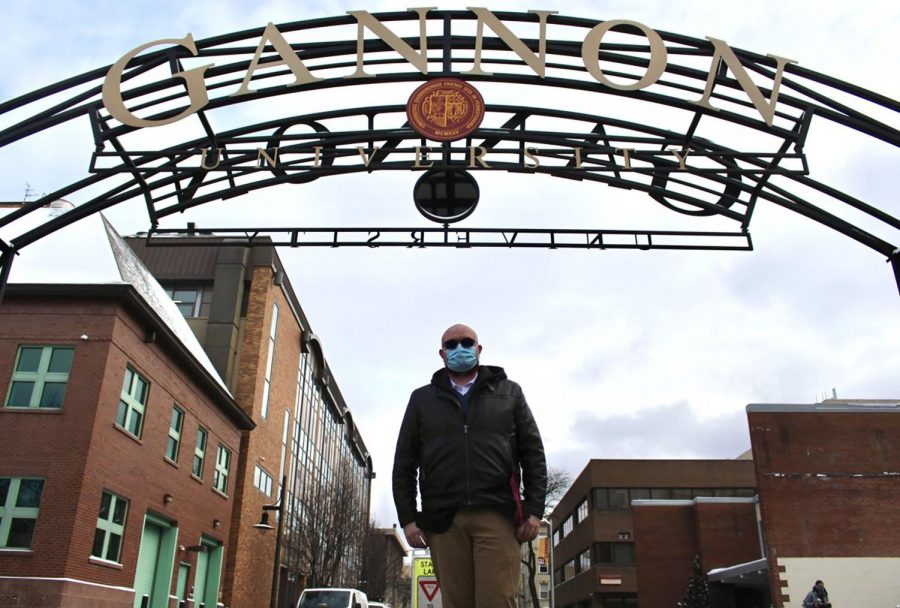Students fight for remote accommodations
February 2, 2021
Gannon University students have been engaged in an effort to expand remote delivery options as the spring semester has begun.
Kathryn Dickey, a junior social work major, has been among those leading the way, as she shared a post to Facebook on Jan. 9 that began circulating through the Gannon community and received much attention.
The post was meant to start a discussion on extending the remote delivery policy to all students.
“I did not expect the number and depth of responses I would get,” Dickey said. “While these responses varied slightly in tone and in their take on the policy, I was profoundly blown away by how deeply Gannon students care about their community and their peers.”
The post went into depth on many different circumstances that students could face, including ways the university could help.
This included bringing up another at-risk group that isn’t just physical but psychological.
It went on to show how students with mental illnesses such as anxiety disorders, obsessive compulsion disorders, depression and even trauma histories are significantly at risk of their conditions worsening while on campus during the pandemic.
The post also listed other situations that could call for the need to learn remotely, such as students who do not feel comfortable living in community housing, commuters who live with at-risk family members, and students who do not feel comfortable gathering in large groups, including in the classroom.
Within 24 hours of the post going live, it had acquired enough attention to start a petition, which gained the university’s attention.
This led to a meeting with Walter Iwanenko, Ph.D., provost and vice president for Student Experience, an employee from the counseling center, and four students including Dickey and Randall Sutter, a junior public service & global affairs major.
During the meeting, Iwanenko agreed to expand the remote delivery policy to a new group.
This included “students who are diagnosed with a mental health/psychological condition that would likely be exacerbated by the need for he/she/them to be physically on campus during the pandemic.”
“I want to credit the students for bringing to my attention how we could strengthen our language so students with diagnosed mental illness did not feel excluded from our process,” Iwanenko said. “Their initiative resulted in a modification of our policy.
“This open communication does not happen at every university,” Iwanenko added.
While the policy changes were not as expansive as some of the petitioners hoped for, it was in line with the group’s ultimate goal to see the remote options become more inclusive.
The university gave students an additional week to request remote delivery with the new guidelines and 10 more students were able to learn remotely as a result.
Dickey said she was pleased with the way the university handled the situation.
“I am happy with the policy changes that include students with mental health concerns,” Dickey said. “I also hope that this policy will be extended to grant all students the choice to learn online.”
After all of the work Dickey did with getting the policy to this point, she said she hopes that more students will begin stepping up and advocating for the change they want to see.
“From here forward, I really want to turn this issue over to the voice of the student body,” Dickey said. “I encourage everyone who has thoughts or concerns about the policy to reach out to the administration and to utilize other formats, like student government town halls, to make their voices heard.”
Other students were also involved in advocating for this change.
Sutter spent a lot of time in discussion with other students and participated in the meeting with Iwanenko; however, he was displeased with the outcome and continues to advocate for change.
“We had a very productive conversation about extending the policy to more students — those afflicted with mental health concerns, commuters living with vulnerable family members, and individuals working with vulnerable populations,” Sutter said. “However, despite reaching an agreement in the meeting, most of our concerns did not make it into the updated policy change.”
While some students feel more comfortable off campus, others feel safer on campus.
Justin Johnson, a senior social work and theology major, was a part of the discussions on Facebook. He is an active student leader on campus and a resident assistant for North Hall.
“From my perspective, Gannon is probably one of the best places to be right now,” Johnson said. “We can send an email and get a COVID-19 test that day and results sent to us the next; if we are in quarantine or isolation, someone brings us food and attends to any of our other needs.”
Through Dickey’s work on the policy changes, more students are now able to continue their education in a way that’s safest for them.
“We have made and will continue to make adjustments and accommodations when and where needed within our capabilities,” Iwanenko said.
FAITH WILSON





